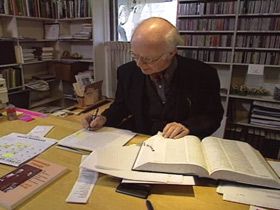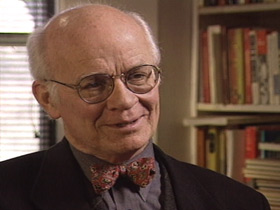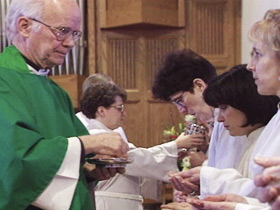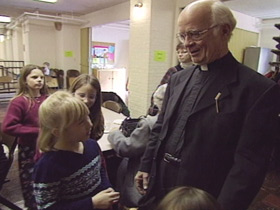Martin Marty
BOB ABERNETHY: If mainline Protestants could have elected a pope anytime over the last generation or so, that person would almost certainly have been Martin Marty, who retired this spring from the University of Chicago Divinity School, just a few weeks after turning 70. Our profile is from Kate Olsen of the NEWSHOUR.
Offscreen Voice: Who is Martin Marty?
KATE OLSEN: Five hundred people turned out to celebrate the 70th birthday of church historian Martin Marty and his retirement from the University of Chicago. The guests were entertained by a video about the man who for decades has been one of the nation’s most influential religious thinkers. Public television commentator Bill Moyers reflected on Marty’s legendary ability to turn out scholarly works on a dime.
BILL MOYERS: But the fact of the matter is, no one knows how many books Marty has written, including Marty. Many of his works have been published under the pseudonym ENCYCLOPEDIA BRITANNICA.

OLSEN: Writing with his favorite jazz or classical music in the background, Marty has produced some 50 books on religion and articles by the thousands, in both popular and academic publications. Many of them explain the diversity of American religion.
MARTIN MARTY: In any university classroom, in any subway, in any ball game, you might well have every religion ever known in ancient Greece, Rome, Egypt, and the yellow pages of today’s phone book.
OLSEN: Marty has sometimes been criticized for his liberalism. But evangelical church historian Mark Knoll of Wheaton College says there’s no religious spokesman quite like him.
MARK KNOLL (Wheaton College): Unlike some other well-known religious figures, Pat Robertson, Oral Roberts, Billy Graham, Marty is known for providing background, for providing context, for providing analysis, whereas these other well-known figures are known for promoting their particular view of religious matters.
The fact that Marty can do these things, can provide analysis to many different sources while clearly remaining obviously himself a person of faith, is remarkable.
OLSEN: Marty seems to be just about everywhere — teaching in Chicago; studying the impact of religion on health; traveling around the country to explore religion where it’s practiced; writing columns and reviews; responding to endless requests from the media; and, with musician wife Harriet, entertaining students at home.
He’s booked two years ahead and scheduled to a minute, using every spare moment of his time. At his birthday dinner, his colleagues used one word to describe him.

Unidentified Woman #1: If I could describe Marty in one word it would definitely be “energy.”
Unidentified Woman #2: “Energetic.”
Unidentified Woman #3: “Energy.”
Unidentified Woman #4: “Energy.”
Unidentified Man: “Energy” really is not enough by itself.
Woman #4: “High energy.”
OLSEN: One secret to his high energy is the seven-minute naps he takes several times a day, wherever he might be. He says it helps him live in the present and not be burdened with the past or worried about the future.
Mr. MARTY: I’ve always been moved at the heart of the Lord’s Prayer. It says, “Give us this day our daily bread.” And the Sermon on the Mount, “Don’t take thought for tomorrow.” These are part of the announcements of the kingdom. They are announcements that tell us that the one who created us doesn’t take care of everything that will ever happen to us. But we get strength for the day we’re in. And a nap frees me for that.
OLSEN: Perhaps Marty’s greatest contribution has been as teacher, what he refers to as his true calling.
Mr. MARTY: You were saying that to find the face of God, you look deeply, deeply, deeply into your own tradition.
Unidentified Student: Yes.

Mr. MARTY: All right.
OLSEN: Three days a week, he’s taught at the University of Chicago Divinity School, where he’s influenced several generations of students studying to become college professors and ministers.
Marty’s faith has been strengthened by his commitment to the neighborhood church, where he’s worshipped for the past 35 years. An ordained Lutheran minister who began his career as pastor, he says community, that gathering of people who can test one another, not doctrine or a formal church body, is what has shaped him.
Mr. MARTY: I am a much more communal believer than individual believer. And so gathering over the bread and the wine on Sunday in the little tiny church, waking up every morning and reminding myself that in our language, I’ve been baptized, I’ve been turned over to God, I’m free for the day. I wake up and make the sign of the cross for the day as a reminder of that. And that frees me and liberates me.
You’re getting baptized the night before Easter, aren’t you?
Unidentified Young Girl: Yes.
OLSEN: Marty remains a lifelong pastor, relating to everyone young and old. Though a Christian, his personal journey of faith has been shaped by other religious traditions too.

Mr. MARTY: I think my own development through the years, both spiritually and intellectually, is to keep one part of the soul or foot on the ground of a tradition, and the other, then you feel free to roam and find ways to integrate other experiences and deal with the other. And in a sense, I try to propagate that notion. I mean, Gandhi was really steeped in his tradition. And he could take Jesus with it. Thomas Merton, the Catholic mystic, talking to Buddhist-Hindu monks the day he died. He doesn’t stop being Catholic, but he enriches there.
OLSEN: Marty’s own search has been nurtured by the Psalms, which he feels speak to the whole range of human experience. After the death of his first wife Elsa, he turned to the Psalms in his grief and wrote his most popular book, A CRY OF ABSENCE. And he explored them again in THE PROMISE OF WINTER, a book featuring photographs by his son Micah. Though sunny by disposition, he prefers what he calls a wintry spirituality.
Mr. MARTY: I have always found that in the discussion of the absence of God is where the presence is most felt, that in the wintry spirituality, one sees more clearly. You see the structure of the tree when the leaves are gone. You see the full horizon when all the bushes are down.
OLSEN: But Marty is also taken with the concept of grace and why so many good things happen to people. He now wants to write about God’s presence, not absence. And if he were to write his own life story, he says it could well be titled AMAZING GRACE.
Mr. MARTY: Join with me in prayer of the Lord.
Congregation (In Unison): Thank you, God.
OLSEN: This is Kate Olsen in Chicago.
ABERNETHY: As you might have guessed, even in retirement Marty won’t be idle. He’s developed the Public Religion Project to study the role of faith in a pluralistic society. A small library of articles and books are almost certain to follow.

